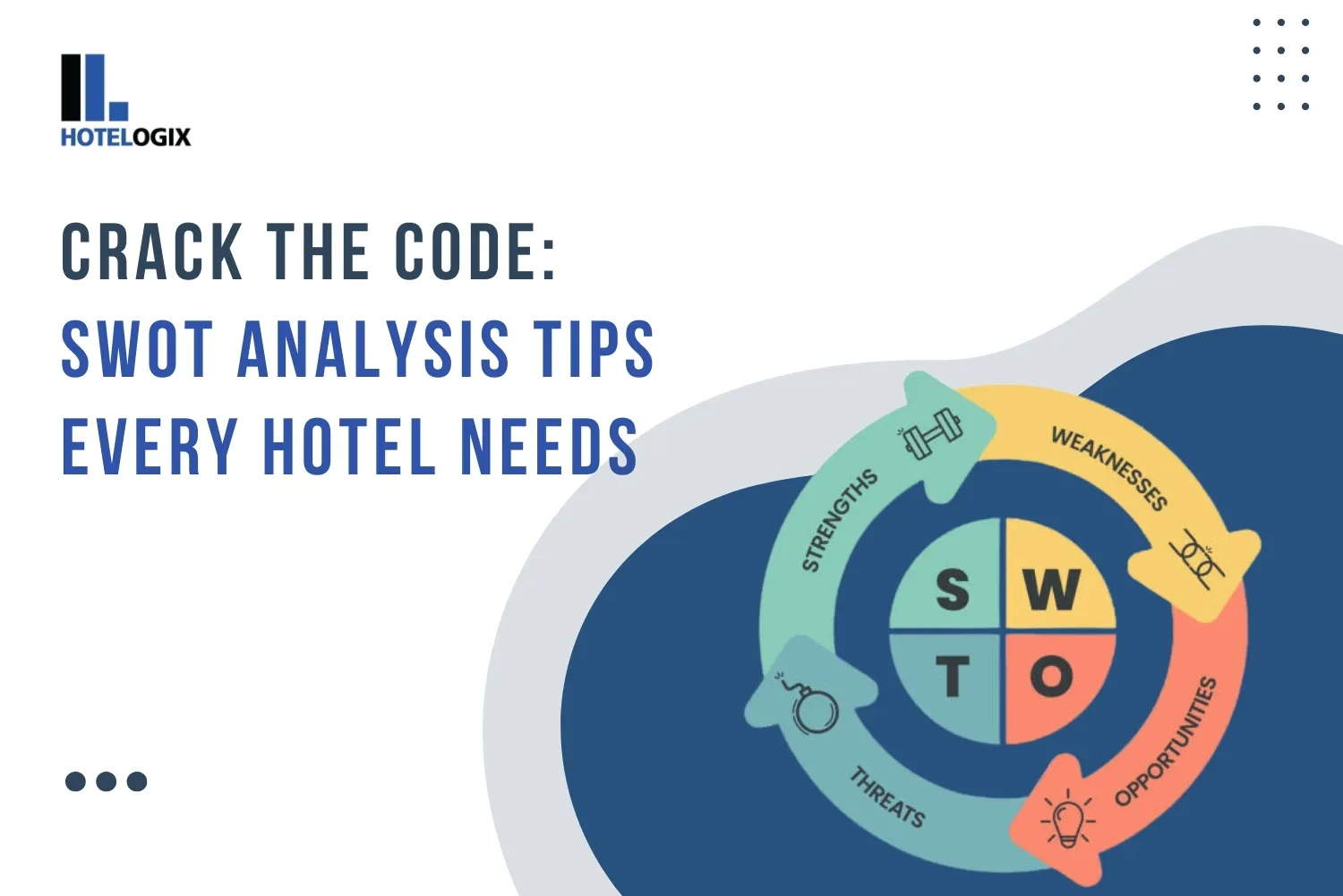In today’s fiercely competitive hospitality landscape, hotels need every edge they can get. Enter SWOT analysis - a powerful tool that’s revolutionizing how hotels strategize and thrive. But what exactly is SWOT, and why has it become a must-have for savvy hoteliers?
Breaking Down SWOT: Your Hotel's Hidden Advantage
SWOT is short for Strengths, Weaknesses, Opportunities, and Threats. It's like a looking glass that reveals your hotel's positives, negatives, and everything else. By showing these four key areas, you see where your hotel is and where it might go.
Why Hotels Should Use SWOT
Think about this: You own a small charming hotel in Chicago's city center. Things are fine, but you know they could improve. That's when SWOT comes in handy. It helps you:
- Find Hidden Treasures: Your rooftop view could be a social media hit, but you haven't made the most of it yet.
- Fix Problem Areas: Your old-fashioned booking system might be hurting your bottom line more than you realize.
- Seize New Chances: A new convention center opening nearby? That’s an opportunity knocking.
- Dodge Bullets: Knowing about that new hotel chain moving in next door helps you prepare.
Real talk? Hotels that use SWOT are like chess players thinking five moves ahead. Those who don’t? They’re playing checkers in a chess world.
Crack the Code: SWOT Analysis Tips Every Hotel Needs
Breaking Down the SWOT Process for Hotels
Stage 1: Know Your Battlefield (Identify Competition)
First things first - who are you up against? In the hotel game, your competition isn’t just the place next door. It’s:
- Hotels in your area
- Airbnb and vacation rentals
- Even unconventional options like glamping sites
Pro Tip: Don’t just list them. Understand them. What makes them tick? Why do guests choose them?
Stage 2: Compare Apples to Apples (Identify Comparatives)
Now, let's dig into the details. What are we comparing? Here's a quick guide:
- Online Ratings and Reviews: BrightLocal's 2023 research revealed that 98% of people check online reviews when looking for local businesses. Your online reputation now serves as your virtual front desk.
- Brand Strength: How well do people know your hotel? A J.D. Power study in 2022 showed that hotels with strong brands saw a 38% rise in people's intention to book.
- Size and Layout: Room count isn't everything. Lodging Magazine's 2023 trend report pointed out that rooms with flexible layouts are becoming a big draw for guests.
- Amenities: Do you have coffee makers in rooms or yoga on the roof? What makes you special? A Hilton study in 2023 showed 79% of people who travel think hotel perks matter more now than before.
- Location: Is your hotel close to the airport? Or right in the middle of downtown? A TripAdvisor study in 2023 found that 89% of travelers see location as a key factor when picking a hotel.
- Food and Drink: The National Restaurant Association said in 2023 that 72% of millennials like hotels that offer unique places to eat.
- Rates and Packages: Being the cheapest doesn't cut it anymore. A Deloitte study in 2023 showed that 60% of people who travel are ready to spend more on hotels that have better practices for sustainability.
- Activities: On-site cooking classes? Local tours? A 2023 Expedia report showed that 65% of travelers are more likely to book hotels offering unique experiences.
- Guest Experience: From check-in to check-out, how smooth is the journey? A 2023 PwC survey revealed that 73% of people point to experience as a key factor in their purchasing decisions.
Read Also - 10+ Brilliant Ideas to Enhance Your Guest Experience
Stage 3: Crunch the Numbers (Tabulate & Score)
Time to put it all on paper. Create a spreadsheet and score each aspect from 1 to 5. Here’s a snapshot:
Stage 4: The Main Event (The SWOT Analysis)
Now, let’s break it down:
Strengths:
- Your hotel scores high on amenities (4/5)
- Solid online ratings (4/5)
Weaknesses:
- Brand strength needs work (3/5)
- Room for improvement in food and beverage offerings
Opportunities:
- The low brand strength score indicates room for marketing improvements
- Potential to capitalize on the trend of experiential travel with unique local activities
Threats:
- Competitor A’s strong brand presence
- Rising demand for sustainable practices, as indicated by the Deloitte study
Keeping Your SWOT Fresh: How Often Should You Do It?
The hotel industry moves fast. A SWOT analysis isn’t a one-and-done deal. Here’s a good rule of thumb:
- Quarterly: Quick check-ins to stay on top of immediate changes
- Annually: Deep dive to align with your yearly strategy
- Before Big Decisions: Thinking of a renovation? New marketing push? Do a SWOT first.
Remember, the world changed overnight in 2020. Who’s to say it won’t happen again? Stay prepared.
Putting SWOT to Work: Real-World Success Stories
Let’s look at how real hotels have used SWOT to level up:
- The Boutique Breakthrough: A small hotel in Portland used SWOT to identify their unique strength - local partnerships. They created packages with local breweries and saw a 30% boost in bookings within six months.
- The Tech Turnaround: A mid-size chain in Texas spotted their weakness in outdated technology. After upgrading their systems, they saw customer satisfaction scores jump by 25%.
- The Sustainability Shift: A resort in Colorado used SWOT to spot the growing demand for eco-friendly stays. They implemented green practices and saw a 40% increase in repeat bookings from environmentally conscious travelers.
How Hotelogix Can Help
For instance, Hotelogix’s advanced booking system can help hotels overcome the weakness of outdated technology, while its integrated channel manager can assist in capitalizing on opportunities like increased online visibility. By facilitating efficient operations and providing real-time insights, Hotelogix enables hotels to continuously refine their strategies based on regular SWOT assessments, ensuring they stay ahead in the dynamic hospitality market.
Your Turn: Making SWOT Work for You
Ready to dive in? Here are some tips to make your SWOT analysis count:
- Be honest: When you do a SWOT analysis, you need to be upfront about your weak points to tackle and boost them. Being straight about issues helps you face real problems, which leads to actual growth and progress in your hotel's branding efforts.
- Get input: Get thoughts from staff at all levels, including those at the front desk and in housekeeping. They bring different views and useful insights that can make your analysis more accurate and thorough. Their day-to-day experiences can show strengths and weaknesses you might miss.
- See Past the Figures: While numbers matter, things like what customers say and how happy your staff are can have a big impact on your business. Paying attention to these small details can result in worthwhile improvements and new ideas.
- Put It to Work: A SWOT analysis shouldn't just gather dust; it should push you to take action. Use what you've learned to make strategic changes and keep looking at and adjusting your plans to stay successful in the long run.
Read Also - Hotel Compset- Meaning, Importance & Tools
SWOT Your Way to Success
In today's ever-changing hotel landscape, where guest preferences evolve rapidly and new competitors emerge constantly, SWOT analysis acts as a guide for hotels. It helps them to make the most of what they're good at, fix what needs work, grab chances to grow, and deal with risks. By using this handy tool and following what it shows, hotels can do more than just stay afloat. They can succeed giving guests great experiences while hitting their business targets.
Key Takeaways:
- Strategic Insight: SWOT provides a clear picture of a hotel’s internal capabilities and external challenges, enabling informed decision-making.
- Competitive Edge: By identifying unique strengths and opportunities, hotels can differentiate themselves in a crowded market.
- Proactive Management: Recognizing weaknesses and threats allows hotels to address issues before they become critical problems.
- Adaptability: Regular SWOT analyses help hotels stay agile and responsive to industry trends and market shifts.
- Holistic Approach: SWOT encourages hotels to look beyond just numbers, considering qualitative factors like guest experience and staff morale.
- Action-Oriented: The true value of SWOT lies in translating insights into concrete strategies and actions.
- Continuous Improvement: Periodic SWOT analyses foster a culture of ongoing evaluation and enhancement.
Remember, a SWOT analysis is not a one-time exercise but an ongoing process. As the industry continues to evolve, regular SWOT analyses will help hotels stay ahead of the curve, adapt to changes, and maintain their competitive edge in the ever-changing world of hospitality.


